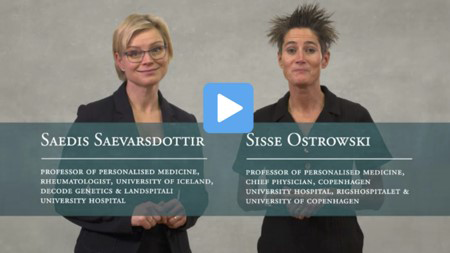By Hakon Heimer
17 March 2022. Students around the world can now draw upon the combined knowledge of precision medicine researchers and clinicians in all the Nordic countries.
 The online course “Personalised Medicine from a Nordic Perspective” represents a collaboration between the leaders of Nordic faculties of health and medicine and the Nordic Society of Human Genetics and Precision Medicine, with funding from the Joint Committee of the Nordic Medical Research Councils (NOS-M).
The online course “Personalised Medicine from a Nordic Perspective” represents a collaboration between the leaders of Nordic faculties of health and medicine and the Nordic Society of Human Genetics and Precision Medicine, with funding from the Joint Committee of the Nordic Medical Research Councils (NOS-M).
The “massive open online course” (MOOC) is designed to introduce the concept of personalized, or precision, medicine as a final-year elective for medical students. With 30 videos in six modules and a faculty of 35 contributors, it is one of the largest online courses ever produced by the Coursera team at the Centre for Online and Blended Learning at the University of Copenhagen (UCPH), which provided significant in-kind support, as did the University of Iceland and deCODE genetics.
Many members of NSHG-PM volunteered their time to create lectures and participate in interview segments, and
“We are very proud of this course,” said Engilbert Sigurdsson, dean of University of Iceland’s medical faculty, on behalf of the Educational Working Group of Faculty leaders at Nordic universities. Sigurdsson led the project with Ulla Wewer, dean of UCPH’s faculty of health and medical sciences.
The curriculum was developed by professors Sisse Ostrowski at University of Copenhagen and Sædis Sævarsdottir at University of Iceland and deCODE genetics.

Introduction to Personalised Medicine from a Nordic Perspective (video, two minutes)
The Nordic model
The technical revolution has generated large numbers of data in healthcare and biomedical research. The rapidly increasing capacity to analyze these data holds great potential to support a change from the one-size-fits-all paradigm of healthcare to personalized medicine, also called precision medicine.
"To be able to make sense of the complexity of human biology, you need an awful lot of data," said NSHG-PM President Kári Stefánsson of deCODE genetics in a promotional video for the course.
Nordic countries provide a unique platform for personalized medicine, with unparalleled health data infrastructure that can be combined for research and the implementation of new knowledge into clinical care.
NSHG-PM officer Søren Brunak of UCPH added that, "In the Nordic countries we have longitudinal data. We can track people over time: not only one disease but actually all the diseases they've had, even if they move around."
The course describes precision medicine from the perspective of patients, healthcare systems, research and development, and infrastructure elements. The extensive Nordic electronic health records, disease registers, and biobanks are poised to generate a learning environment that is integrated with everyday care of patients.
The curriculum also covers communication of risk and the ethical, legal, and social aspects of personalized medicine, and presents examples where the approach already is used in routine care.
“The course has already become part of the optional curriculum for last-year medical students' electives at the universities of Copenhagen and Iceland,” said Sigurdsson. “It can also be harnessed as part of specialist training courses and continuing medical education (CME) activities in this field as well as for doctoral and master-level students in allied health sciences.”
The course is still in its “beta test” phase at the two lead universities, but in the first month it jumped onto the list of the 30 most popular Coursera MOOCs worldwide. The creators are encouraging health and medical faculties across the region to add the course to their regular 2022-2023 elective offerings.
"We want to emphasize that this should be thought of a basic course to gain understanding of the personalized medicine concept from different angles, and we hope it will give insights into future possibilities in the Nordic countries," said Sævarsdóttir. "We also hope that this can serve as a platform to add on more in-depth activities in this field, and bridge the gap between basic research and the everyday clinic."
Even if you are not affiliated with a university that is offering the course for credit, you can watch the videos by creating an account at Coursera.

